The British Empire & the Culture War: When Colonial History Becomes Politics with Prof. Alan Lester
December 11, 2024
Prof. Alan Lester
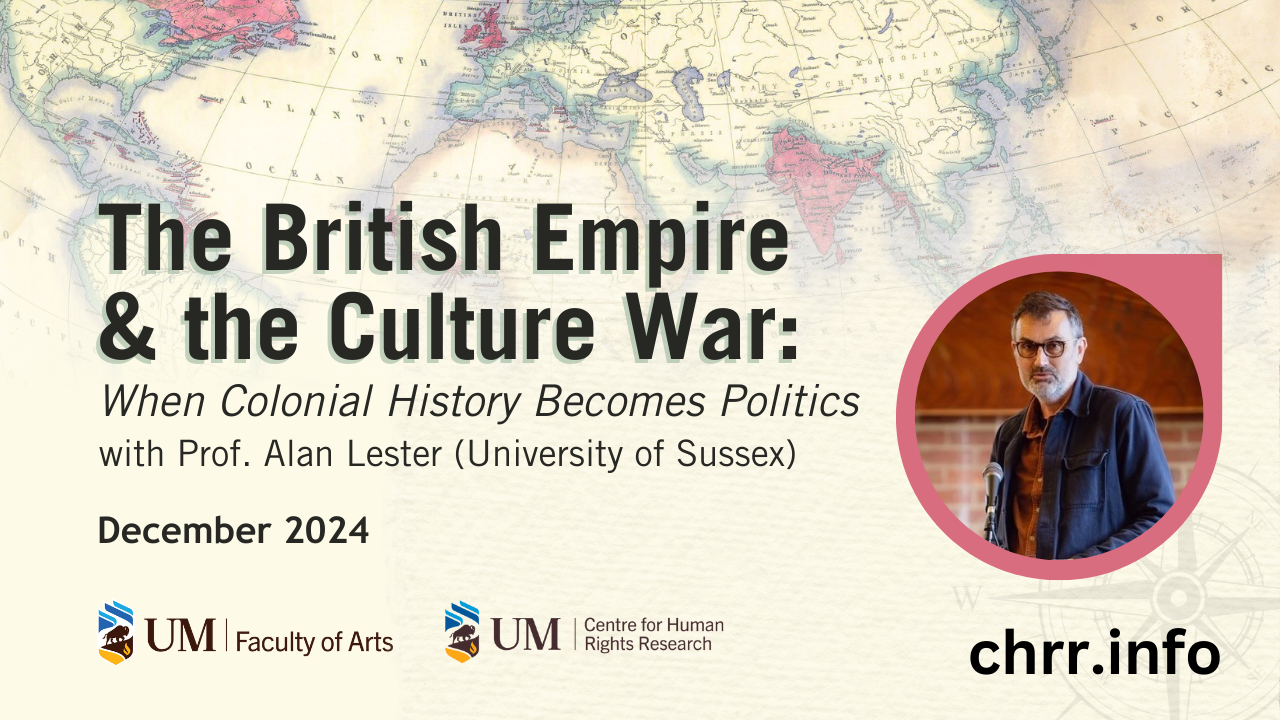
On Wednesday, December 11th at 2:00 pm, the Centre for Human Rights Research welcomed Prof. Alan Lester from the University of Sussex for a lecture on “The British Empire & The Culture War: When Colonial History Becomes Politics.”
Alan Lester is Professor of Historical Geography at the University of Sussex. He has held visiting lectureships at Rhodes University and the University of Fort Hare, an Erskine Fellowship at the University of Canterbury and an inaugural fellowship in humanities at La Trobe University. He has also been Research Professor (Historical Studies) at La Trobe. He is a Fellow of the Royal Historical Society and the co-editor of the Manchester University Press Studies in Imperialism series. Alan’s most recent edited collection The Truth About Empire: Real Histories of British Colonialism features a chapter by CHRR Director Dr. Adele Perry, CHRR Research Affiliate Dr. Sean Carleton, and CarletonU’s Dr. Omeasoo Wahpasiw titled “The Misuse of Indigenous and Canadian History in Colonialism.”

Pride in Health 2024 Drag Show – Graphic Recording
Pride in Health 2024 Drag Show - Graphic Recording
November 21, 2024
Miranda Maslany, Drawing Change
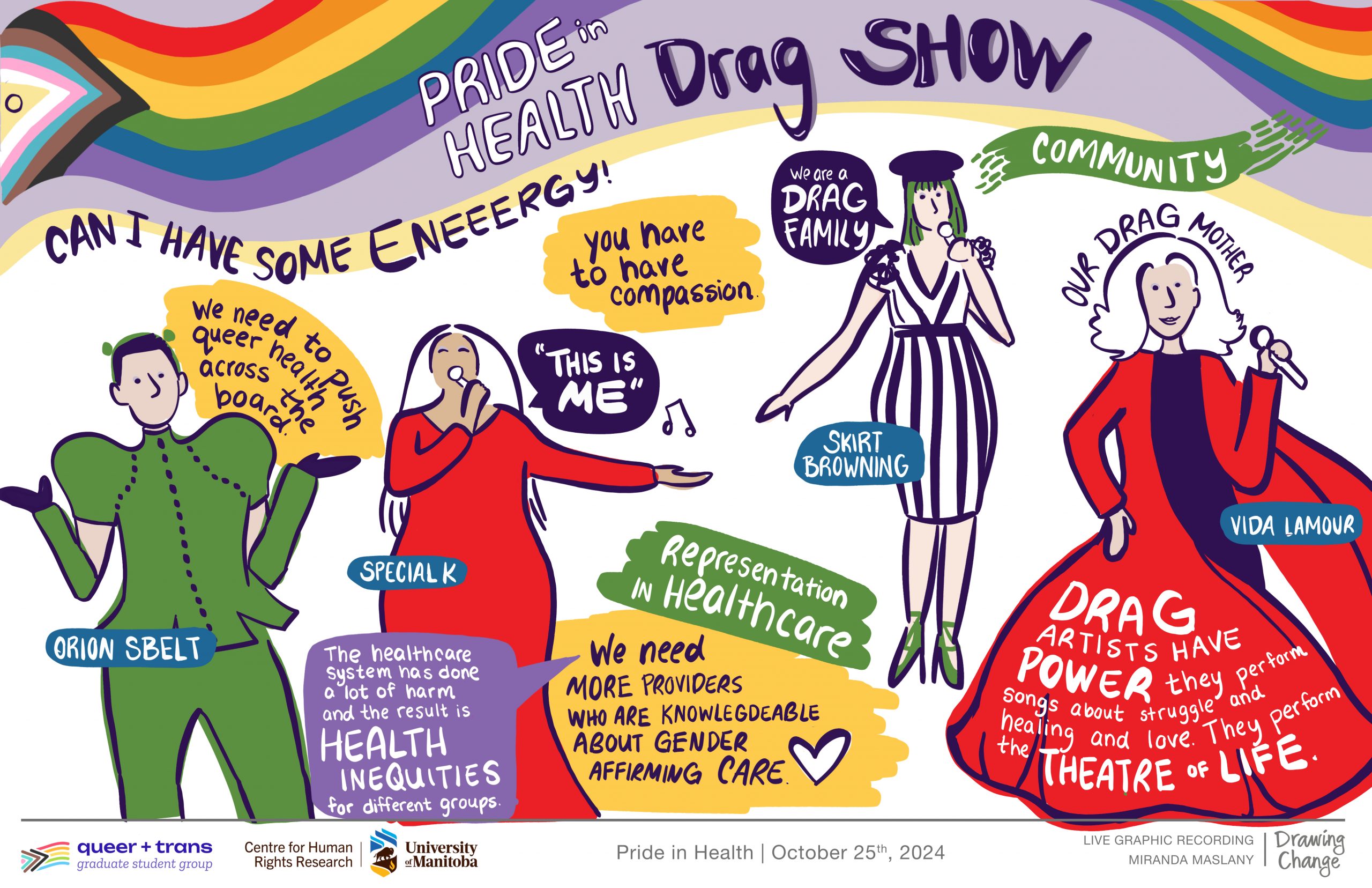
In October 2024, the Centre for Human Rights Research (CHRR) supported and co-coordinated the inaugural Pride in Health conference with the Queer and Trans Graduate Student Group (QTGSG). Pride in Health is an interdisciplinary health research conference focused on the 2SLGBTQIA+ community. This year, the conference was held on October 24 and 25. The first day of the conference was held on the Fort Garry Campus, and the second day was held on the Bannatyne campus.
On the second day of the conference, a drag show was held featuring Orion Sbelt, Special K, Skirt Browning, and Vida Lamour to celebrate the 2SLQBTQIA+ community in Manitoba and beyond. The drag show was coordinated with Synonym Art Consultation. A graphic recording of the drag show was created by Miranda Maslany from Drawing Change.

Resisting Anti-Queer and Anti-Trans Hate: Lessons from 1970s Toronto with Dr. Tom Hooper
Resisting Anti-Queer and Anti-Trans Hate: Lessons from 1970s Toronto with Dr. Tom Hooper
October 31, 2024
Angela Ciceron

On Friday, October 11, 2024, the CHRR supported the 2SLGBTQ+ Histories Series at the University of Manitoba for a lecture with Dr. Tom Hooper from the Department of Equity Studies in York University who spoke on “Resisting Anti-Queer and Anti-Trans Hate: Lessons from 1970s Toronto”.
About the lecture:
In January 1978 anti-Queer and anti-Trans activist Anita Bryant brought her “Save Our Children” campaign to Toronto. The previous year Bryant had organized against a Miami-Dade, Florida ordinance that protected against discrimination based on sexual orientation. Bryant’s central argument was that this ordinance protected Queer and Trans people from discrimination in employment, including teachers and others who worked with children. The campaign to define Queer and Trans people as a threat to children worked, the Miami-Dade ordinance was repealed. Bryant was emboldened and embarked on a cross-continent campaign that also included a brief time Canada. Queer and Trans communities resisted these campaigns with various tactics. In this presentation I argue that studying our communities’ resistance to Anita Bryant could be useful as our communities rally to resist anti-Queer and anti-Trans hate today.

An Evening with Katsi’tsakwas Ellen Gabriel & Sean Carleton (When the Pine Needles Fall)
An Evening with Katsi'tsakwas Ellen Gabriel & Sean Carleton (When the Pine Needles Fall)
October 30, 2024
Katsi'tsakwas Ellen Gabriel, Sean Carleton, and Kiera Ladner
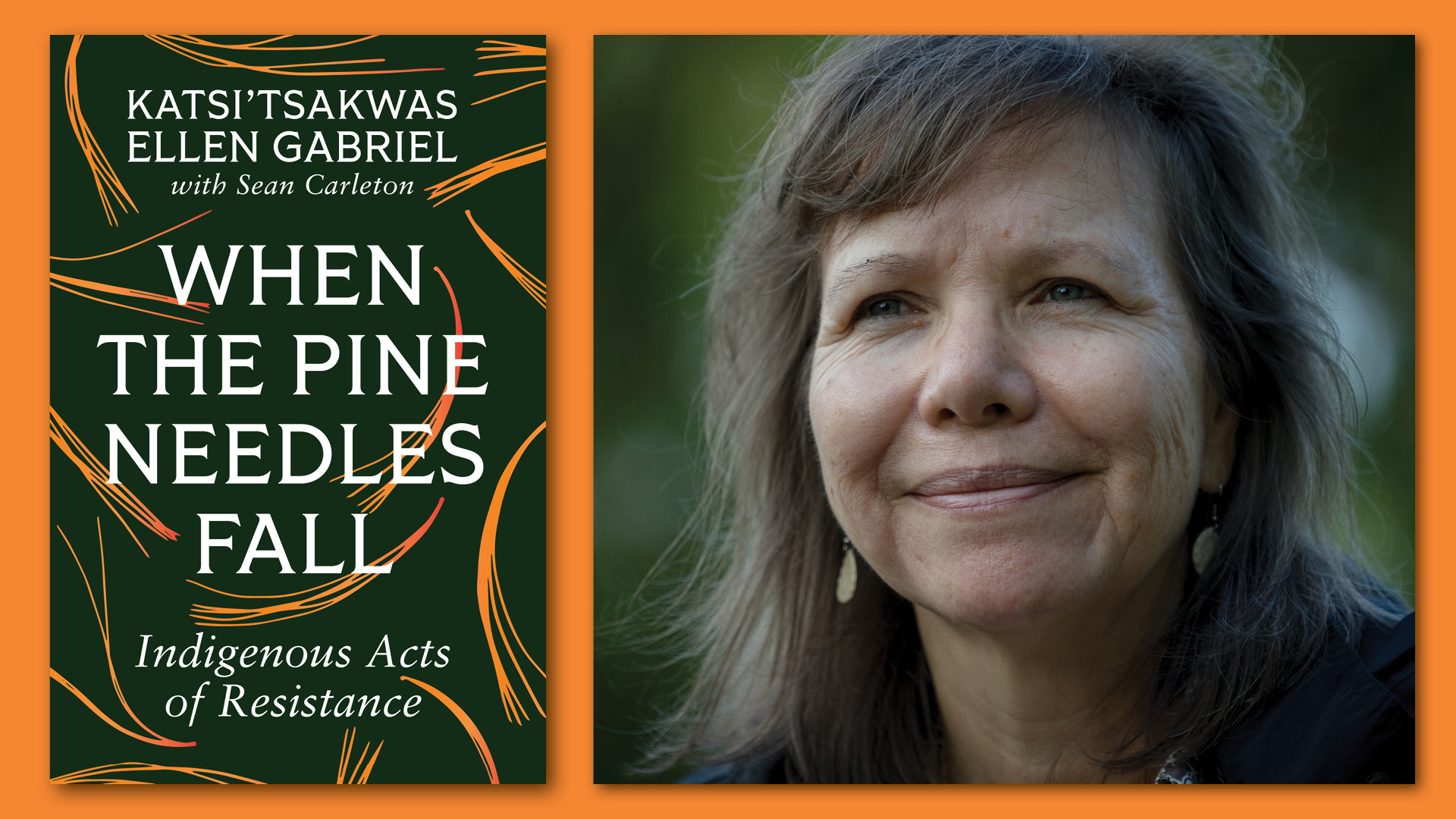
On Wednesday, October 2, 2024, the Centre for Human Rights Research (CHRR) and McNally Robinson Booksellers hosted Katsi’tsakwas Ellen Gabriel and Dr. Sean Carleton for a special evening to discuss their new book, When the Pine Needles Fall: Indigenous Acts of Resistance (Between the Lines). The event was hosted by CHRR Research Affiliate Dr. Kiera Ladner.
On When the Pine Needles Fall:
There have been many things written about Canada’s violent siege of Kanehsatà:ke and Kahnawà:ke in the summer of 1990, but When the Pine Needles Fall: Indigenous Acts of Resistance is the first book from the perspective of Katsi’tsakwas Ellen Gabriel, who was the Kanien’kehá:ka (Mohawk) spokesperson during the siege. When the Pine Needles Fall, written in a conversational style by Gabriel with historian Sean Carleton, offers an intimate look at Gabriel’s life leading up to the 1990 siege, her experiences as spokesperson for her community, and her work since then as an Indigenous land defender, human rights activist, and feminist leader. Gabriel’s hopes for a decolonial future make clear why protecting Indigenous homelands is vital not only for the survival of Indigenous peoples, but for all who live on this planet.

A Resource Guide on Missing and Murdered Indigenous Women, Girls, Two-Spirit and Gender Diverse People in Canada
A Resource Guide on Missing and Murdered Indigenous Women, Girls, Two-Spirit and Gender Diverse People in Canada
October 15, 2024
Angela Ciceron

Trigger Warning: The content in this resource guide may be difficult and/or triggering. If you or someone you know needs emotional assistance related to this topic or the information in this article, help is available 24/7 through the MMIWG Support Line, 1-866-413-6649.
In May 2024, the Centre for Human Rights Research and Indigenous Engagement and Communications hosted Cambria Harris in honour of Red Dress Day. This resource guide was created to provide a starting point for people seeking to educate themselves about the issue of missing and murdered Indigenous women, girls, Two-Spirit, and gender diverse people (MMIWG2S+) in Canada. It also lists resources for those seeking help or resources in line with MMIWG2S+.
Related Resources
Support Us
Whether you are passionate about interdisciplinary human rights research, social justice programming, or student training and mentorship, the University of Manitoba offers opportunities to support the opportunities most important to you.
“Dancing with fire in limbo”: The consequences of Myanmar migrants’ ambiguous legal status in Thailand
"Dancing with fire in limbo": The consequences of Myanmar migrants' ambiguous legal status in Thailand
May 20, 2024
Dr. Sai Kyi Zin Soe
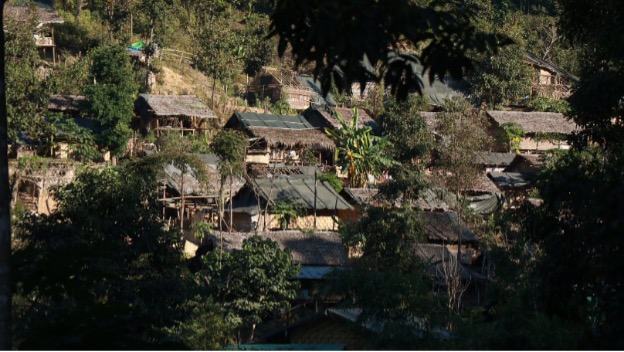
The Department of Anthropology and the Centre for Human Rights Research hosted a lecture with Dr. Sai Kyi Zin Soe on May 30, 2024. Dr. Soe’s presentation “”Dancing with fire in limbo”: The consequences of Myanmar migrants’ ambiguous legal status in Thailand” explores the challenges faced by Burmese refugees in Thailand, who navigate the precarious circumstances of displacement and legal ambiguity. Drawing on social science research, it examines the drivers of forced migration from Myanmar, including the intensified civil war, persecution of ethnic minorities, and economic hardship. In Thailand, these refugees are officially classified as “illegal migrants,” leaving them in a state of limbo without access to essential services and vulnerable to arrest and deportation. Simultaneously, Burmese nationals face pressure to conform to their communities’ expectations regarding political activism and in-country revolution. The presentation emphasizes the importance of understanding these complex realities through a social science lens to inform holistic, rights -based approaches to development policy and practice. By advocating for legal recognition, refugee empowerment, and research-informed strategies, this presentation highlights the transformative potential of social science in shaping policies that bridge the gap between displacement and belonging, positioning refugees as agents of change.
Dr. Sai Kyi Zin Soe is a Research Affiliate at the Centre for Disability Research and Policy, Faculty of Medicine and Health at the University of Sydney. Currently, he serves as a Senior Consultant at the Foundation for Education and Development (FED), dedicated to assisting Myanmar migrants in Thailand. Additionally, he provides support to the Karenni State Interim Parliament (KSIP) in the capacity of a Technical Advisor.

“No One is Disposable” with Mostafa Henaway
"No One is Disposable" with Mostafa Henaway
March 2024
Mostafa Henaway
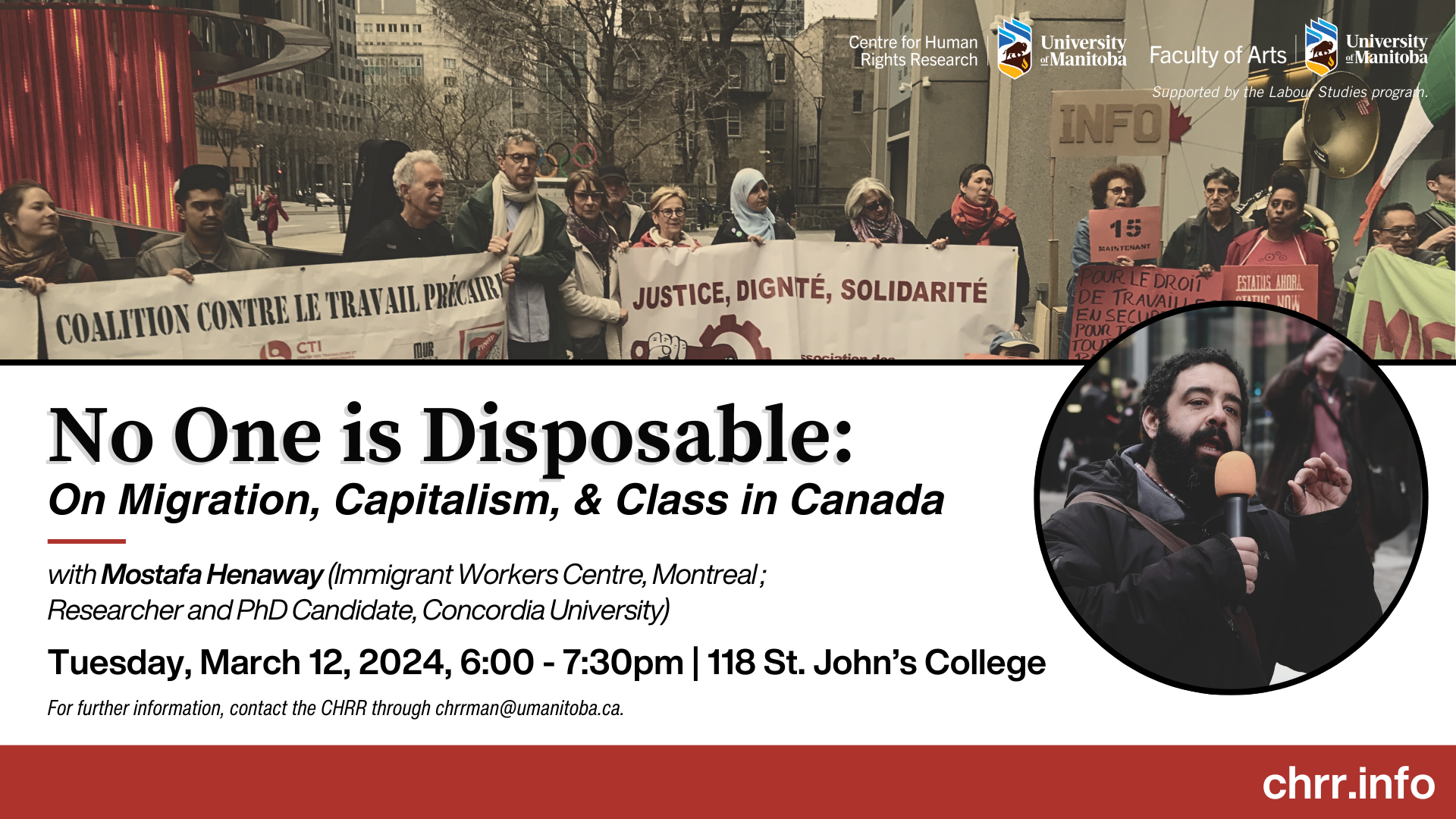
The Centre for Human Rights Research (CHRR) and the Faculty of Arts at the University of Manitoba, hosted Mostafa Henaway (Immigrant Workers Centre – Montreal) for a lecture titled “No One is Disposable: On Migration, Capitalism, and Class in Canada” on March 12, 2024 at the University of Manitoba.
Henaway, a Canadian-born Egyptian, is a long-time community organizer at the Immigrant Workers Centre in Montreal, where he has been organizing for justice for immigrant/migrant workers for over two decades. He is also a researcher and PhD candidate at Concordia University. In his new book, Essential Work, Disposable Workers: Migration, Capitalism and Class, he examines “the massive expansion of precarious work under neoliberalism and how migrant workers are challenging the conditions of their hyper-exploitation through struggles for worker rights and justice.”
Related Resources
Support Us
Whether you are passionate about interdisciplinary human rights research, social justice programming, or student training and mentorship, the University of Manitoba offers opportunities to support the opportunities most important to you.
Solidarities + Connections with Palestine: A Podcast
Solidarities + Connections with Palestine: A Podcast
June 6, 2024
Centre for Human Rights Research
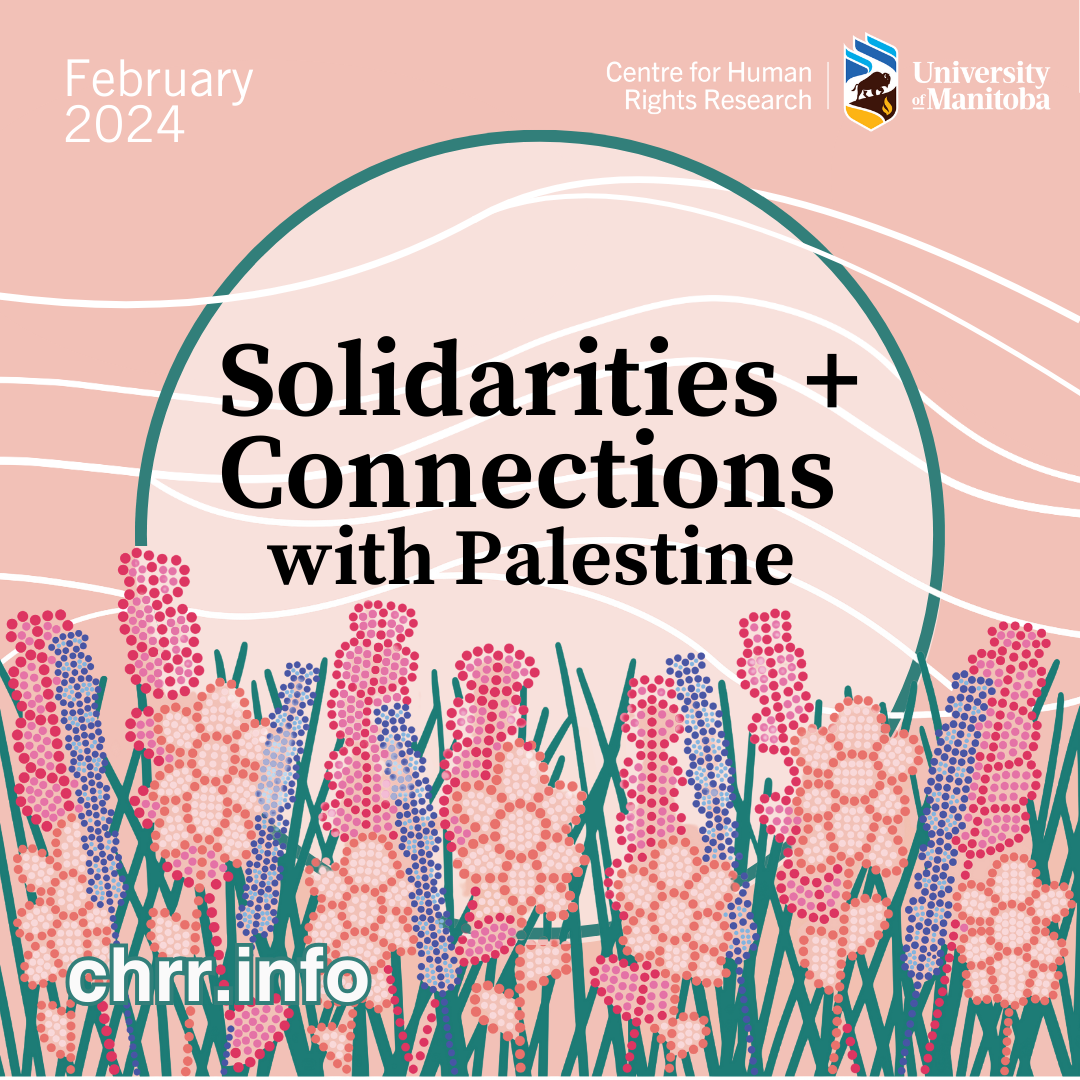
Since the Nakba in 1948, countless Palestinians have been permanently displaced from their country due to the establishment of the state of Israel on Palestinian land. As of May 29, 2024, 36,171 Palestinians have been killed since October 2023 due to the genocide in Gaza, with approximately 1.7 million people being displaced (UN OCHA).
On February 28, 2024, the Centre for Human Rights Research held a virtual panel on Solidarities and Connections with Palestine . The panel sought to identify and develop connections between Treaty 1 and Palestine and we were honoured to host Winnipeg Centre MP Leah Gazan, Independent Jewish Voices Harold Shuster, University of Ottawa’s Alex Neve, and University of Toronto’s Youcef Soufi. Ethel Tungohan also joined the conversation. This conversation reminded us that is a crucial time for individuals, communities, and institutions to stand firmly for human rights — including the rights of people to live free of the human rights violations and international crime that have marked decades of occupation and violence in Israel and Palestine. Our latest podcast is drawn from the conversations from this webinar. Access the podcast at Spotify, Amazon Music, or iHeart Radio.
Artwork: “Wāpikwanīya (Flowers)” by Carly Morrisseau

An Event in Honour of Red Dress Day with Cambria Harris
An Event in Honour of Red Dress Day with Cambria Harris
May 2, 2024
Cambria Harris

The content in this video may be difficult and/or triggering. If you or someone you know needs emotional assistance related to this topic or the information in this article, help is available 24/7 through the MMIWG Support Line, 1-866-413-6649.
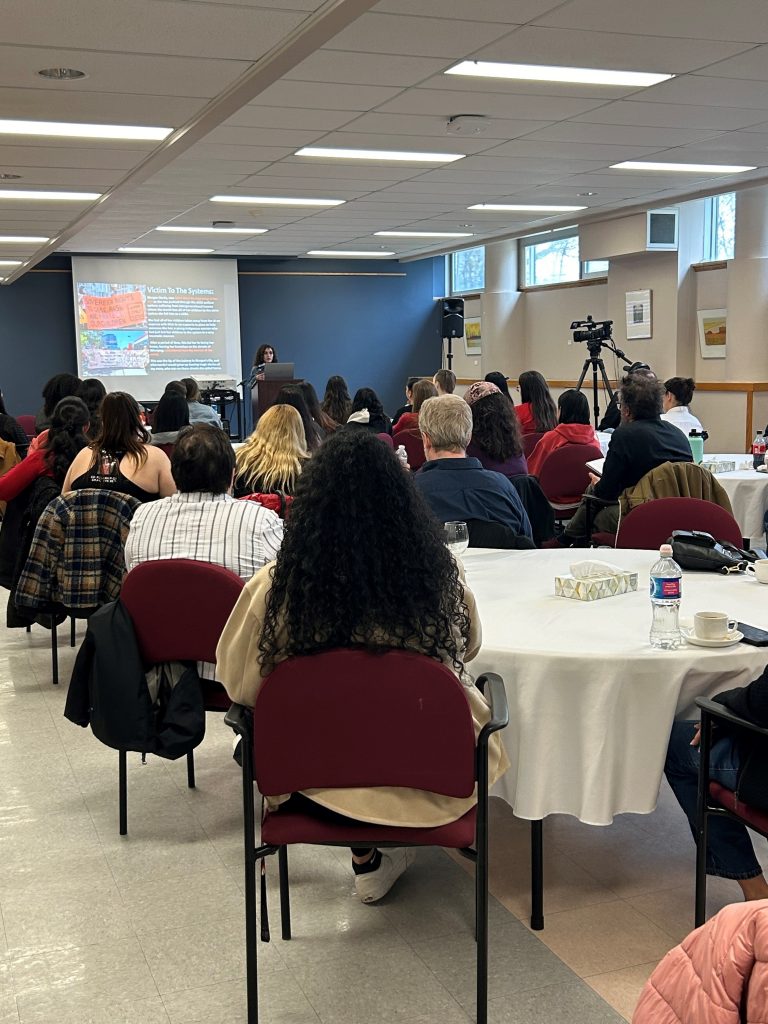
On Thursday, May 2nd, 2024, Indigenous Engagement and Communications, the Department of Indigenous Studies, the Margaret Laurence Endowment Fund (Women’s and Gender Studies) and the Centre for Human Rights Research at the University of Manitoba were honoured to host Cambria Harris for an event in honour of the National MMIWG2S+ Awareness Day, or Red Dress Day.
The name ‘Red Dress Day’ is inspired by the work of Métis artist Jamie Black who began The REDress Project in 2010 to raises awareness about the thousands of missing and murdered Indigenous Women, Girls, and 2SLGBTQQIA+ Peoples. It began as an art installation that hung hundreds of empty red dresses in public spaces to remind people of the First Nations, Métis, and Inuit women and girls lost because of gender-based violence.
Read more about the Calls to Justice.

Care Activism in Canada: Migrant Domestic Workers, Dissident Friendships and Decolonial Care
Care Activism in Canada: Migrant Domestic Workers, Dissident Friendships and Decolonial Care
March 19, 2024
Dr. Ethel Tungohan and Diwa Marcelino
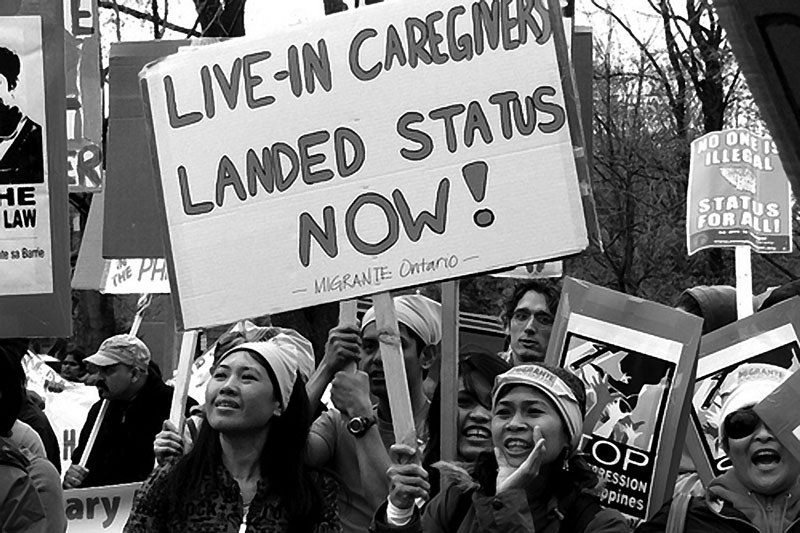
Dr. Ethel Tungohan in conversation with Diwa Marcelino, Migrante Manitoba
In collaboration with the Global College – University of Winnipeg, the Centre for Human Rights Research (CHRR) at the University of Manitoba hosted Dr. Ethel Tungohan (York University) for a seminar titled Care Activism in Canada: Migrant Domestic Workers, Dissident Friendships and Decolonial Care. Dr. Tungohan was in conversation with Migrante Manitoba representative and community organizer Diwa Marcelino.
Ethel Tungohan is a Canada Research Chair in Canadian Migration Policy, Impacts and Activism and an Associate Professor of Politics at York University in Toronto, Canada. Her book, “Care Activism: Migrant Domestic Workers, Communities of Care, and Movement Building,”, won the National Women’s Studies Association First Book Prize. Her research looks at social movements, immigration policy, social and public policy, and Canadian and comparative politics.
Diwa Marcelino is a community organizer with Migrante Manitoba, a grassroots organization advancing the rights and welfare of overseas Filipinos within the framework of peoples’ struggle for democracy, justice & peace in the Philippines. Migrante Manitoba is a founding member of Health Care for All Manitoba, an alliance advocating for expanded public health care coverage to include all residents of Manitoba regardless of status. During the Freedom Convoy occupations in 2022, he became the national project manager for the Community Solidarity Project, a civil society response to rise of the politics of division and hate. He is also a founding member of Community Solidarity Manitoba. He is also the vice-chairperson of the Council of Canadians, a grassroots organization challenging corporate power and advocating for people, the planet and our democracy. He is also a steering committee member of KAIROS, an ecumenical organization promoting ecological justice and human rights.
This seminar is a part of our annual Critical Conversations seminar series. This year, the seminar series focused on the CHRR’s research theme Reproductive and Bodily Justice and explored histories of the body, reproduction, and care in Canada and beyond.

Contact Us
We’d love to hear from you.
442 Robson Hall
University of Manitoba
Winnipeg, Manitoba
R3T 2N2 Canada
204-474-6453
Quick Links
Subscribe to our mailing list for periodic updates from the Centre for Human Rights Research, including human rights events listings and employment opportunities (Manitoba based and virtual).
Traditional Territories Acknowledgement
The University of Manitoba campuses are located on the original lands of the Anishinaabeg, Ininiwak, Anisininewuk, Dakota Oyate, Dene and Inuit, and on the National Homeland of the Red River Métis.
Centre for Human Rights Research 2023© · Privacy Policy

